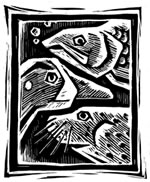- Home
- Restoration Projects
- Project Search
- SEA: Salmon Predation 94320-E
Project Information
Title: SEA: Salmon Predation 94320-E
Project Year and Number: 1994: 94320-E
Other Fiscal Years and Numbers for this Project: 1999: 99320-E-CLO, 1998: 98320-E, 1997: 97320-E, 1996: 96320-E, 1995: 95320-E
Principal Investigator (PI): Mark Willette (Alaska Department of Fish & Game)
Managing Agency: ADFG
Assisting Personnel: Greg Carpenter, Mark Clapsadl, Karen Hyer, Margaret Powell, Penny Saddler
Research Location: Prince William Sound
Restoration Category: Research
Injured Resources Addressed: Pink Salmon
Abstract: This project is a component of the Sound Ecosystem Assessment (SEA) program, a multi-disciplinary effort to acquire an ecosystem level understanding of the marine and freshwater processes that interact to constrain levels of fish, marine bird, and marine mammal production in Prince William Sound (PWS). Pink salmon are an important food source for fish, birds, and mammals, and provide a pathway for the transfer of nutrients accumulated from high seas marine areas to near shore and terrestrial ecosystems. Pink salmon are vital to the economy of PWS communities. Evidence indicating that the EVOS was partially responsible for weak pink salmon returning to PWS is growing. This component of the SEA program is a multi-year project designed to determine to what extent variations in predation may affect the survival of juvenile pink salmon, and will identify and describe the mechanisms that cause variation in predation. This first year, basic information regarding the identity, distribution, and behavior of salmon predators will be obtained. Field and experimental studies will be conducted in future years.Proposal: Not Available
Reports:
Final Report: View (1,658 KB)
Publications from this Project: None Available
